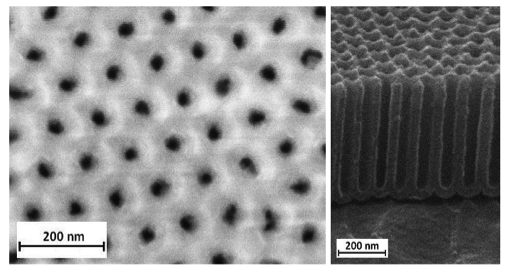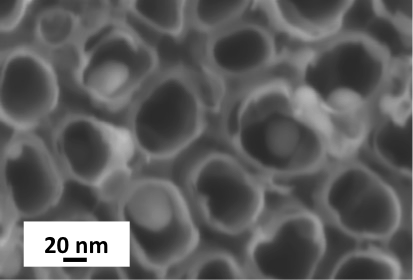Nanostructured surfaces
The research activities area deal with materials science for the development of technological applications involving nanostructured surfaces. The group has two areas of research:
- The fabrication and characterization of nanostructured surfaces and nanoparticles
- The modeling of the wettability of nanostructured surfaces.
The fabrication of nanostructured surfaces of titanium oxide or alumina is obtained on different types of metal substrates by electrochemical methods involving anodizing and electro-depositing processes. The synergetic combination of these different methods and their modularity make it possible to obtain a wide variety of nanoreliefs from metal oxide nanotube layers, nanopillars to nanostructured polymers. These nanostructured surfaces allow studies of wettability by contact angles and their modeling.

Our research in the field of nanostructured surfaces is part of the development of new detection methods. Thus we develop electrodes consisting of nanostructured surfaces associated with the presence of nanoparticles of noble metals for the implementation of future miniaturized detectors. Nanostructured surfaces in the form of nanotube layers are used as host matrices for nanoparticles. The objectives of this research are firstly the development and characterization of nanoparticles of noble metals (gold, silver) in suspension to keep the nanometric properties of the latter. The syntheses of the nanoparticles developed in the laboratory deal with soft chemistry processes mainly using the reduction of metal salts in solution, in a context of development of eco-conceptual method. In a second step, it is a question of ensuring an effective association of the nanoparticles with the nanoporous surface of the host electrode, by strategies of electro deposition of nanoparticles or by dip-coating route. The development of these nanosensors opens the way to many applications in the field of detection through the use of nanostructured electrodes associated with the presence of nanoparticles.

Contact person:
Oscar AWITOR, Pr
komla.awitor@uca.fr
komla.awitor@uca.fr

